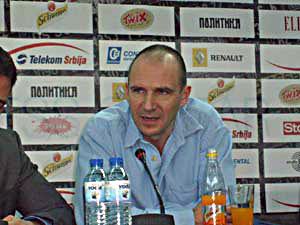|
Ralph Fiennes in BelgradeBy Rada Djurica After opening FEST (Belgrade International Film Festival) distinguished guest Ralph Fiennes had another mission: to scout locations for his first directing effort, Shakespeare's Coriolanus next year. The architectural mix seen in Belgrade suggests history, and Fiennes' creative team liked the aesthetics, finding the locations suitable for shooting. "We can create the world that we were thinking of, and at the same time it would be financially efficient," stressed Fiennes in a press conference. So FEST will not be the last Belgrade sees of Fiennes. Fiennes starred in The Reader, a film directed by Stephen Daldry which opened the festival. The well-directed, superbly-acted and emotionally-engaging drama won praise from Belgrade's audience. The screenplay was written by Davie Hare, the writer of The Hours, based on a 1995 novel by Bernhard Schlink, which was an international bestseller for its controversial take on the relationship between a teenage boy and an older woman, exploring questions about post-war German guilt for the Holocaust. The story follows three time frames: young Hannah (Kate Winslet), a woman in her 30s who seduces Michael (David Kross), a teenage boy. After sex she asks him to read aloud to her, and that romantic, dreamy setting serves as a prelude further for depictions of the horrors of World War II and the other side of Hannah, as a guard in a concentration camp. A decade later, after the war, Michael sees her again, from a distance, in court, where she is accused of a serious war crime. The Reader makes Hannah sympathetic by presenting her through the young, romantic Michael's eyes, as a figure of mystery and desire. Thus, the controversy that has surrounded the film. Fiennes spoke out about the character of Hannah: "That was not an intention of the director, to make Hannah more sympathetic. I think that a good actor for this role is very important, because the actor is an advocate for his role. The actor's job is to indicate aspects of the role: whatever they (the characters) have done, you have to show the completeness of the role. Some people find it distributing, and they mistakenly misinterpret Daldry's intention to show Hannah as sympathetic. Michael is very traumatized by Hannah. And again, he is in the position to keep her at a distance. He is disturbed by what she has done. At the same time, he also experiences another side of her, and he can not let go of that either. The film is not only about the character of Hannah but also Hannah's effect on Michael. The intention was to show human beings." In revelations later on, the film explores the her horrific crimes she has committed during the war. The film is nonetheless redemptive, taking on the difficult task of exploring national guilt, morality and the weight of history. Fiennes explained his view of how such films can lead to understanding: "I think the scene that made me want to play in this film is the one where writer David Hare tries to show his understanding by a conversation with Ilana, mother of the concentration camp surviver, played by Lena Olin. This line leapt out: 'Do not go to a camp to look for catharsis. Go to literature, theatre. There's nothing in the camps now; there's nothing in there.' I think that everyone needs to respond to those lines, to its black hole. And there is no enlightenment by obsessing about it. Here Michael's meeting with Ilana is the first where there's indication that they might understand him. So emotionally, this is the beginning to talk about it He has never been able to speak about this before; so emotionally, this is the beginning of being able to talk about it. At the end of the film, he starts to tell his daughter, and I think that being able to talk about trauma, being able to give utterance to experience that has wounded him is the beginning of life, is, somehow, the beginning of the healing. And it's interesting to compare, if you think about truth and reconciliation in South Africa, where people are open and talk about atrocities committed over them. It is dialogue and discussion on a personal level to Michael, and that is the beginning of a healing process."
|
